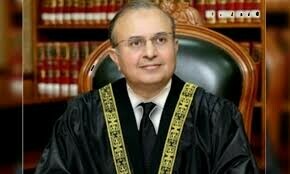Closely following the 26th Amendment’s section, Equity Mansoor Ali Shah on Monday commented that the subject of locale would “emerge consistently” in the High Court (SC) following regulation on sacred seats.
After receiving assent from President Asif Ali Zardari and receiving approval from both houses of Parliament, the eagerly awaited 26th Constitutional Amendment became law in the early hours of Monday.
The 26th Amendment carries changes to the Constitution, the vast majority of which relate to the legal executive. Removing the Supreme Court’s suo motu authority, limiting the chief justice of Pakistan’s (CJP) term to three years, and giving the prime minister the authority to select the next CJP from among the three most senior SC judges are some of the main reforms.
The best number of corrections are to Article 175A, which manages the course of arrangement of judges to the High Court, high courts and the Government Shariat Court (FSC).
Instead of the president appointing the “most senior judge of the Supreme Court” as the CJP, the top judge will now be “appointed on the recommendation of the Special Parliamentary Committee from amongst the three most senior” SC judges under the proposed amendments to clause 3 of Article 175A.
Proviso 3 of another Article 191A confines SC seats other than Protected seats to “practice following locales vested in the High Court”, specifically: ( a) the Supreme Court’s original jurisdiction under Article 184; b) the Supreme Court’s appellate jurisdiction under clause 3 of Article 185 when a high court’s judgment or order passed under Article 199 concerns the constitutionality of any law or a significant legal question regarding the interpretation of the Constitution; furthermore (c) warning purview of the High Court under Article 186.
On Monday, while hearing a case connected with the Opposition Commission of Pakistan, Equity Shah passed a happy comment, saying: ” Will this case currently go to the established seat or could we at any point hear it?”
“It appears now that this question will emerge consistently in the High Court, whether the case will be heard by the typical seat or protected seat,” Equity Shah said.
In response, Advocate Farogh Naseem stated that political cases are now constitutional cases.
At this, Equity Ayesha Malik said, “Presently it ultimately depends on you and your established seats.”
Equity Shah then, at that point, dismissed the case for quite a long time, expressing that by then they would have greater lucidity on the circumstance.



